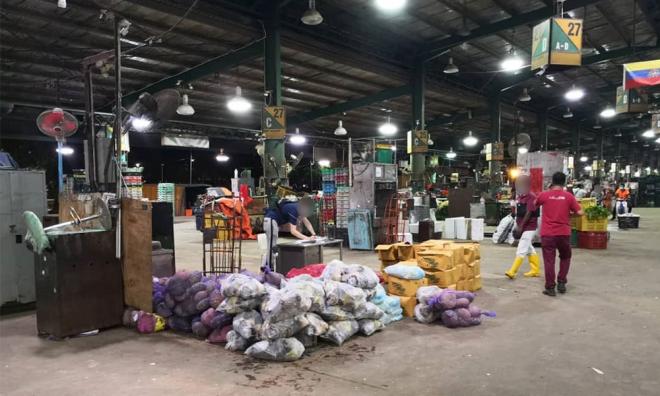
CORONAVIRUS | Faced with a shortage of manpower that resulted in only a small fraction of seafood stalls resuming operations at the Kuala Lumpur wholesale market, wholesalers are requesting for the government to allow them to hire undocumented migrant workers.
Speaking with Malaysiakini, Kuala Lumpur Hoi Seong Fish Wholesaler Association Sing Kian Hock said only 22 seafood stalls out of 168 resumed operation last Saturday but the number reduced to only six stalls earlier today.
Manpower has always been a contentious issue for seafood wholesalers as they hire up to 90 percent migrant workers who mostly worked illegally, he said.
"As such, when the Kuala Lumpur City Hall (DBKL) announced that only legal workers to (are allowed to) enter (the wholesale market), most of the stalls were affected and unable to resume operations," he said.
The government had imposed more stringent rules against the wholesalers following a Covid-19 outbreak at the wholesale market and its surrounding area.
The wholesale market was closed down for five days last week, and the vicinity surrounding the wholesale market were placed under enhanced movement control order (MCO) started April 20.
The enhanced MCO also resulted in the wholesale market's migrant workers being confined to their homes, resulting in many traders being unable to resume operations or operate in a smaller scale when the wholesale market reopened on April 25.
Other reasons that caused havoc with manpower include the government requirement for legal workers and those who enter the wholesale market must first obtain a medical report to prove that they are free from coronavirus infection.
Elaborating further, Sing said only 30 percent of the market's migrant workers live outside the enhanced MCO area and not subjected to the lockdown.
He urged the government to issue temporary work permits to these undocumented migrant workers so they could come in to help the wholesalers.
"(As for a long term solution), we are urging the government to legalise them. The association had approached various ministries in the past two years on the matter but to no avail," he said.
"The government said wholesalers operate a stall and not a shop. That's why we could not have our migrant workers legalised.
"It is very difficult for us to employ local workers as they don't want to work in 3D (dangerous, dirty and difficult) jobs. A fish box weights up to 200kg with ice. Not many are willing to take such smelly and heavy labour as jobs," he said.
Sing said he would raise the matter with DBKL and even write to the Human Resource Ministry.
"I will raise the matter not merely on behalf of my association but also for everyone who is affected by this issue. This includes our vegetable and fruit wholesaler counterparts at the wholesale market, as well as the seafood hawkers and wholesaler in the industry," he said.
The government allows migrant workers to be hired for the manufacturing, construction, plantation and agriculture sectors.
It is estimated that the country has approximately four million foreign workers with more than half of them illegal.
Under the 11th Malaysia Plan, Malaysia planned to cap the employment of foreign labour below 15 percent of the total workforce in the country by 2020.
Malaysia recorded a total of 15 million workers in 2019. - Mkini



The wholesellers should start looking at new ways of bringing their products from the lorries to the market or stalls. Dont use human muscles only, try using mechanised means and ways to unload the heavy boxes. The pays for the illegals are cheaper so you rather hire them then the locals. Shame on you. Its time for you to go away with cheap undocumented labours.
ReplyDelete